John Garth
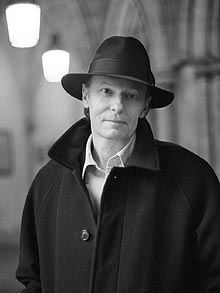 In my Evening Standard review of The Meaning of Night (18 September 2006, reproduced below), I ought perhaps to have declared an interest. I knew the author, Michael Cox, though only slightly, and only by email and telephone.
In my Evening Standard review of The Meaning of Night (18 September 2006, reproduced below), I ought perhaps to have declared an interest. I knew the author, Michael Cox, though only slightly, and only by email and telephone.
Michael Cox (pictured right by Jerry Bauer) had been introduced to me in 2003 as the editor who would go over Tolkien and the Great War and save me from any errors and infelicities. HarperCollins rated him highly and felt he would be attuned to my subject because he had written a biography of M.R. James, the classic ghost story writer. He had also been an editor for Oxford University Press, producing The Oxford Anthology of English Ghost Stories and The Oxford Anthology of Victorian Detective Stories detective fiction as well as the magisterial Oxford Chronology of English Literature.
Just as he was starting work on my final typescript in June 2003, Michael had to go into hospital for a serious operation. All I knew was that he had some kind of cancer. But surgery scarcely put him off his stride, and he wrapped up the job with quiet efficiency, despite having to do battle with me over a number of points of style on which I was rather cavalier by his standards (he would not have approved of this sentence, for example, because it begins with but). But (there I go again) he was complimentary about Tolkien and the Great War, and since he was virtually the first person to read it, his compliments meant a great deal to me indeed. And in the light of what followed, they mean even more to me now.
In January 2005 I was standing at the picture desk at the Standard when in the pile of photographs for use in that day’s paper, I caught sight of one captioned ‘Author Michael Cox’. My heart sank because I knew he had been very ill. For a second, before it occurred to me that the Standard was unlikely to note the passing of anyone who was not a household name, I thought he must have died. I was, thankfully, quite wrong; and as of that day Michael was quite famous. He had just been handed the largest-ever publisher’s advance for a British debut novel - a figure of £500,000 was mentioned.
I emailed my congratulations and Michael replied:
It’s been an incredible week - my wife and I still can’t believe what's happened. And I haven’t even finished the book yet!
The money exceeds every fantasy I had about getting the novel published. Even more hard for me to understand has been everyone's reaction to the book itself. I simply can’t believe I’ve written something (apparently) so extraordinary, though dozens of hard-bitten professionals are telling me that I have. We’re now waiting to see who will take it in the USA.
I remember working on your wonderful book with great pleasure and am delighted that I had a small part to play in its publication. And it fully deserves its prize - and more besides, if there's any justice.
Needless to say, these are comments I treasure.
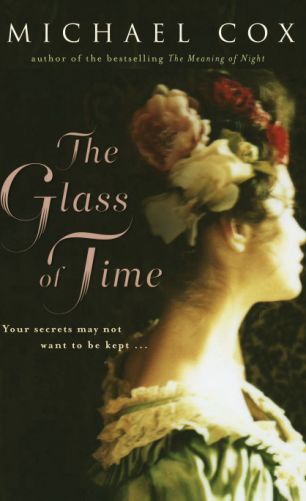 Michael readily agreed to be interviewed by me for the Standard, but his agent overruled him because exclusive deals had already been signed elsewhere. As these interviews revealed, The Meaning of Night was partly, in a perverse way, a by-product of his illness. Fear of going blind due to the tumour now attacking his optic nerve, together with the steroids prescribed to counter the tumour, had unleashed a fearsome energy, spurring him to hammer into shape a set of ideas that he had been mulling over for thirty years. But what he produced was no stream-of-consciousness cri de coeur, even though that would have been an entirely understandable response to his predicament. Instead he had created an astonishingly well-constructed psychological Victorianesque drama of crime and mystery.
Michael readily agreed to be interviewed by me for the Standard, but his agent overruled him because exclusive deals had already been signed elsewhere. As these interviews revealed, The Meaning of Night was partly, in a perverse way, a by-product of his illness. Fear of going blind due to the tumour now attacking his optic nerve, together with the steroids prescribed to counter the tumour, had unleashed a fearsome energy, spurring him to hammer into shape a set of ideas that he had been mulling over for thirty years. But what he produced was no stream-of-consciousness cri de coeur, even though that would have been an entirely understandable response to his predicament. Instead he had created an astonishingly well-constructed psychological Victorianesque drama of crime and mystery.
The advance for The Meaning of Night allowed Michael to complete the novel without the distraction of having to make a living from editing other people's books. It was a deserved success when it appeared in September 2006. The money also saw him through the writing of a sequel, The Glass of Time, published two years later. But it could not prolong his life. He last told me in January 2009 that he now had very little sight left in his remaining eye; he was ‘halfway through dictating a supernatural novella, but it’s hard going’. He agreed to meet me on one of his London hospital trips and sign my copies of his two novels. But on 3 April I read that he had died, on 31 March, at the age of 60.
So I can't say that I knew Michael, except as an expert copy-editor and courteous correspondent. But even this limited acquaintance, together with what I now know of his situation, drives home what a courageous man he was - the kind for whom the word stoic was invented.
I should add that my review of The Meaning of Night, which now follows, would have remained the same if I had never heard of Michael Cox before. The book is simply superb.
John Garth, April 2011
The Meaning of Night
Michael Cox
John Murray 2006
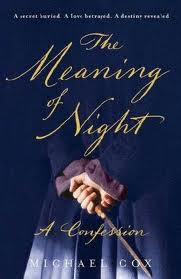 To write a novel of Victorian scope and complexity is a rare and eccentric achievement today. To write it in little over a year, amid severe illness, is Victorian (if not quite Dickensian) in ambition and execution. But Michael Cox was spurred by the threat of blindness to realise an idea formed three decades ago, and propelled into a creative frenzy as a side-effect of steroid treatment.
To write a novel of Victorian scope and complexity is a rare and eccentric achievement today. To write it in little over a year, amid severe illness, is Victorian (if not quite Dickensian) in ambition and execution. But Michael Cox was spurred by the threat of blindness to realise an idea formed three decades ago, and propelled into a creative frenzy as a side-effect of steroid treatment.
He has dug deeply, rather than travelled far, for his raw materials. Most of the book moves between London and Northamptonshire, where Cox lives. The bibliographical cravings of his protagonist and several other leading characters draw upon his own musty, dusty pursuits when he was editor of the vast Oxford Chronology Of English Literature. The sombre habiliments of Victorian crime fiction, touched with a viscous splash of horror, reflect an expertise and taste also expressed in the anthologies of 19th century detective and ghost stories that Cox — biographer of M.R. James — has previously compiled.
We begin near the end, at the premeditated butchering of a complete stranger, randomly selected so that his killer, Edward Glyver, may practise for the murder he truly desires to commit — the act by which he aims to avenge a lifelong wrong. The question probed is how a man, cultured, intelligent and empathetic, can convince himself beyond doubt that such acts are justifiable. The plot consists of the gradual uncovering, through Glyver’s own sleuth-work, of the events that precipitate the acts of savagery bracketing the novel.
| “The atmosphere crackles, but beneath all is a sly sense of humour. The plotting is second to none — a finely tuned yet extravagantly complex piece of clockwork” |
While the opening act echoes Crime And Punishment, the setting evokes Bleak House, moving between dying baronial estates and the capital’s purulent underbelly. The novel’s subtitle, A Confession, inevitably points to De Quincey’s opium eater and Hogg’s justified sinner.
Yet here is much more than pastiche: a novel of fate and free will, forensic detection and blind love, crime and its justifications. The atmosphere crackles, but beneath all is a sly sense of humour. The plotting is second to none — a finely tuned yet extravagantly complex piece of clockwork.
It is a wonder that Cox’s characters have room to breathe; and Edward Glyver’s plunge into love does not quite hit the requisite emotional pitch. Yet he remains a fascinating and disturbing figure, and each of the many bit players is a distinctive creation. Where Dickens gives his Tulkinghorns and Gamps some signature eccentricity — a pointing finger, an umbrella — Cox more generously finds individuality in unique histories of feeling: family, love, personal injury. If it does not wring tears from us, The Meaning of Night does its real job superbly well, drawing us on to the climax as inexorably as its haunted hero.
© Evening Standard 2006. Reproduced with permission.
The Worlds of
J.R.R. Tolkien
UK hardback
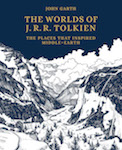
US hardback

To buy in French, Russian, Czech, Spanish, Italian, Finnish, Hungarian, German, or another language
see links here
Buy
Tolkien and
the Great War
UK paperback/ebook
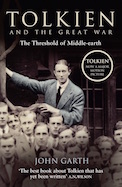
US paperback/ebook
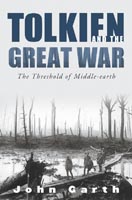
Audiobook read by
John Garth
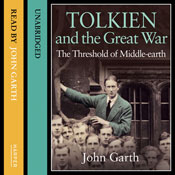
Amazon UK, Audible UK,
Audible US
To buy in Italian, German, French, Spanish or Polish,
see links here
Buy
Tolkien at
Exeter College
